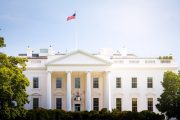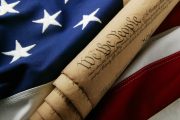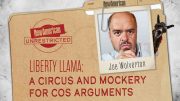
Although some of the surveillance authority of the National Security Agency (NSA) may be about to expire, there are several sister agencies that will carry on monitoring the communications of Americans — most of which is in direct violation of the protections provided by the Fourth Amendment to the Constitution.
In a blog post he wrote days ago, Senator Mike Lee (R-Utah) provides a history of the “search and seizure” provision of the Fourth Amendment. He begins by setting the stage for his informative rehearsal of relevant historical events:
The Constitution of the United States protects the American people against unreasonable searches, and it does so against a long historical backdrop of government abuse. Over time, our founding fathers came to an understanding that the immense power of government needs to be constrained. They understood that those in power will tend to accumulate more power, and in time they will tend to abuse that power, unless that power is carefully constrained. America’s founding fathers were informed in many respects by what they learned from our previous national government, our London-based national government.
In order to recover from the debt incurred in fighting the French in the Seven Years War (Britain’s national debt nearly doubled during that protracted global conflict), the king and parliament decided to impose a series of taxes on America. The colonists’ opposition to these taxes was not based on the amount; rather they refused to submit to a scheme of revenue raising that directly violated their centuries-old rights as Englishmen, particularly those rights recorded in the Magna Carta.
Apart from the taxes, however, King George II (and his son and successor, George III) issued orders known as general writs of assistance. In simple terms, these writs authorized law enforcement and other representatives of the crown to enter buildings to search for contraband without obtaining a warrant. This did not sit well with American Englishmen, and they were determined to boldly declare their determination not to be subjected to searches that exceeded the constitutional authority of the king and parliament.
Another unconstitutional aspect of these writs was the fact that they were not specific, that is to say, they did not name the place to be searched, the things to be searched for, or the people who aroused the suspicion of illegal behavior.
These warrantless “warrants” were not only served on Americans, however. British subjects at home were harassed in similar fashion. It is at this point in the story that we continue with Senator Lee’s narrative:
John Wilkes, not to be confused with John Wilkes Booth, the assassin of Abraham Lincoln, was a member of [the] English parliament. In 1763 he found himself at the receiving end of King George III’s justice. In 1763, John Wilkes had published a document known as the North Briton Number 45. The North Briton was a weekly circular, or type of news magazine in England. Unlike most of the other weeklies in England at a time, The North Briton was not dedicated to the praise of King George III and his ministers. From time to time, this weekly would actually criticize the actions of King George.
At the time John Wilkes published The North Briton Number 45, he became the enemy of the King because he had criticized certain remarks delivered by the King in his address to Parliament. While not openly and directly critical of the King himself, he criticized the King’s ministers who had prepared the remarks. For King George III this was simply too much. This simply could not stand. So on Easter Sunday 1763 John Wilkes found himself arrested and he found himself subject to an invasive search.
Now this search was performed pursuant to a general warrant. In other words, this was a warrant that didn’t specify the names of the individuals to be searched, the particular places to be searched, nor the particular items subject to that invasive search. It said in essence to go and find the people responsible for this horrendous publication, North Briton Number 45, and go after them. Search through their papers. Get everything you want. Get everything you need.
Wilkes went on to win his freedom in court and was reelected to parliament for several terms. The number “45” in his North Briton became a symbol for liberty on both sides of the Atlantic. As Senator Lee rightly relates: “People would celebrate by ordering 45 drinks for their 45 closest friends. People would recognize this symbol by writing the number 45 on the walls of taverns and saloons. The number 45 came to represent the triumph of the common citizen against the all-powerful force of an overbearing national government.”
The official website of colonial Williamsburg adds to the account of Wilkes’s fame and the association of “45” with the struggle to restore individual liberty:
Energized by Wilkes’s victory, the others scooped up by the general warrant sued the government — an unprecedented action — and won, precipitating what scholar Arthur Cash calls “a momentous shift in the locus of power in government” from the privileged to the masses. Soon cries of “Wilkes and Liberty!” were heard across London, and the author of No. 45 embodied a movement of revolt against the government. The number 45 became a symbol of radical politics: one liberty-loving parson delivered a sermon on the forty-fifth verse of Psalm 119, “I will walk in Liberty, for I keep thy precepts.”
In America, our Founders not only praised Wilkes for his courage, but they used his experience as a cautionary tale that informed their own efforts to shield the citizens of their new union from similar deprivations of the fundamental right to be free from warrantless general writs.
The Framers abhorred this practice, believing that “papers are often the dearest property a man can have” and that permitting the government to “sweep away all papers whatsoever,” without any legal justification, “would destroy all the comforts of society.”
In 1776, George Mason, the principal author of the Virginia Declaration of Rights — a document of profound influence on the construction of the federal Bill of Rights — upheld the right to be free from such searches, as well: “That general warrants, whereby any officer or messenger may be commanded to search suspected places without evidence of a fact committed, or to seize any person or persons not named, or whose offence [sic] is not particularly described and supported by evidence, are grievous and oppressive, and ought not to be granted.”
Thus, the Fourth Amendment:
The right of the people to be secure in their persons, houses, papers, and effects, against unreasonable searches and seizures, shall not be violated, and no warrants shall issue, but upon probable cause, supported by oath or affirmation, and particularly describing the place to be searched, and the persons or things to be seized.
The rights guaranteed by the Fourth Amendment are under nearly constant assault by the forces of the federal government. From NSA surveillance to IRS use of tax records as a political tool, the papers, effects, and homes of all Americans are now de facto denied the protections our Founders held so dear.
The undeniable truth is that not a single one of our Founding Fathers, not even the most ardent advocate of a powerful central government, would have remained even one day at the Philadelphia Convention if he had believed that the government they were creating would become the instrument of tyranny that it has become.
Taken together, the federal government’s consolidation of control and cognizance reduces every American to the status of “suspect.”
Senator Lee suggests a solution to the reemergence of general warrants:
Now, the proper American response to government overreach involves setting clear limits, limits that will allow the people to hold the government accountable. We must not permit this type of collection to continue. While it’s true that a single call record reveals relatively little information about you, the important thing to remember is that when you aggregate all of this data together the government can tell a lot about you.
Of course, the surest way to stop the surveillance and gut the general warrants is for states to follow the advice of James Madison and refuse to “cooperate with officers of the union” when their actions exceed the constitutional limits of their authority.




